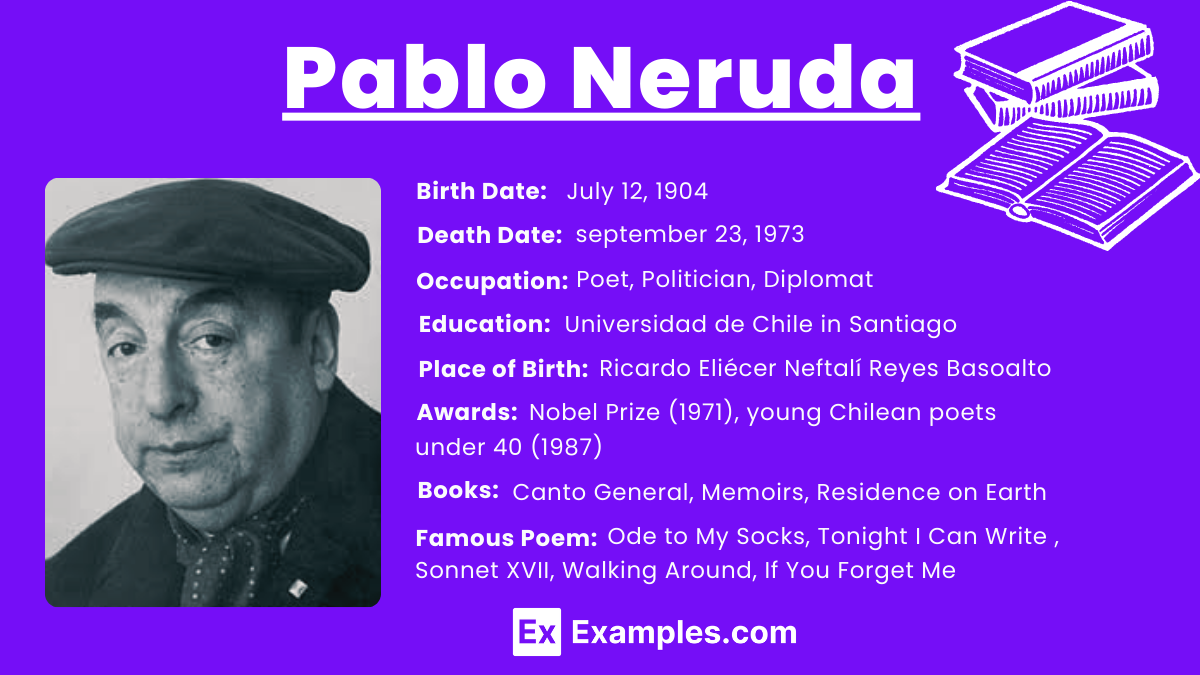Pablo Neruda Poet – 5 Famous Poems and Biography
Introduction of Pablo Neruda (1904–1973) :
Pablo Neruda, born Ricardo Eliécer Neftalí Reyes Basoalto in 1904, was a renowned Chilean poet, diplomat, and politician. Widely celebrated for his passionate and sensuous poetry, Neruda’s works encompass a range of themes from love and nature to political and social issues. He gained international fame with his collection “Twenty Love Poems and a Song of Despair,” which remains one of the most popular books of poetry. His dedication to social justice and his service as a diplomat, including his tenure as a senator, further solidified his legacy. In 1971, Neruda was awarded the Nobel Prize in Literature, honoring his profound impact on the literary world. His unique voice and powerful imagery continue to inspire readers globally, making him a towering figure in 20th-century literature.
Famous Poems By Pablo Neruda
Mara Mori brought me
a pair of socks
which she knitted herself
with her sheepherder’s hands, ……
2. Tonight I Can Write (The Saddest Lines)
Tonight I can write the saddest lines.
Write, for example, ‘The night is starry and the stars are blue and shiver in the distance.’
The night wind revolves in the sky and sings. ….
3. Sonnet XVII
I don’t love you as if you were a rose of salt, topaz,
or arrow of carnations that propagate fire:
I love you as one loves certain obscure things, …….
It so happens I am sick of being a man.
And it happens that I walk into tailorshops and movie houses
dried up, waterproof, like a swan made of felt …..
I want you to know
one thing.
You know how this is:
if I look …….
Pablo Neruda Biography
Early Life and Education
Pablo Neruda, born Ricardo Eliécer Neftalí Reyes Basoalto on July 12, 1904, in Parral, Chile, was the son of José del Carmen Reyes Morales, a railway worker, and Rosa Basoalto, a schoolteacher who died shortly after his birth. Raised in Temuco by his father and stepmother Trinidad Candia Marverde, Neruda showed an early interest in literature. He attended the local Boys’ School and later the Temuco Girls’ School, where poet Gabriela Mistral, a future Nobel laureate, was the principal and encouraged his literary pursuits.
Literary Career
Neruda adopted his pen name in honor of the Czech poet Jan Neruda to avoid conflict with his family’s disapproval of his writing career. His first collection of poems, “Crepusculario” (Twilight), was published in 1923, followed by the immensely popular “Twenty Love Poems and a Song of Despair” (1924). These works established Neruda as a leading poet of his generation. His poetry evolved over time, encompassing themes of love, politics, and social justice, often characterized by passionate and vivid imagery.
In the 1930s, Neruda’s political views deepened, influenced by the Spanish Civil War and the assassination of his friend, Spanish poet Federico García Lorca. This period saw the publication of his influential collection “Residence on Earth” (1933-1945), which reflected his growing political awareness and disillusionment with the world.
Political Involvement
Neruda’s political engagement extended beyond his poetry. He served as a Chilean diplomat in various countries, including Burma, Sri Lanka, Mexico, and Spain. His experiences abroad reinforced his commitment to social justice and his opposition to fascism and imperialism. In 1945, Neruda joined the Communist Party of Chile and was elected as a senator. His outspoken criticism of President Gabriel González Videla’s anti-communist policies led to his exile in 1948. During this time, he wrote “Canto General” (1950), an epic poem chronicling Latin American history and its struggles for freedom.
Pablo Neruda Books
Pablo Neruda authored a vast array of poetry collections and books, many of which are considered masterpieces of world literature. Here are some notable works by Neruda:
- “Twenty Love Poems and a Song of Despair” (1924)
- “Residence on Earth” (1933-1947)
- “Canto General” (1950)
- “Elemental Odes” (1954)
- “Extravagaria” (1958)
- “One Hundred Love Sonnets” (1959)
- “Memoirs” (1974)
- “The Captain’s Verses” (1952)
Pablo Neruda Awards
The Pablo Neruda Awards are associated with two prominent literary prizes.
Nobel Prize for Literature (1971): Neruda was awarded the Nobel Prize for Literature in 1971. The Nobel Committee recognized him for his poetry that, with the action of an elemental force, brings alive a continent’s destiny and dreams.
Pablo Neruda Prize for Poetry: Part of the Nimrod Literary Awards, this prize is open to poets internationally. The competition offers a first prize of $2,000 and publication, and a second prize of $1,000 and publication. Winners and finalists also participate in a virtual awards ceremony and reading. The competition for the 46th annual awards begins on January 1, 2024, and the deadline for submissions is April 1, 2024. Poets can submit 3-10 pages of unpublished poetry (Nimrod) (Winning Writers).
Pablo Neruda Award: This award, granted by the Pablo Neruda Foundation since 1987, honors young Chilean poets under 40. It includes a diploma, a medal, and a monetary prize of $6,000, presented at La Chascona, Neruda’s house museum in Santiago. The award recognizes a writer actively contributing to the literary field
Pablo Neruda Death
Pablo Neruda, the Nobel Prize-winning Chilean poet, died on September 23, 1973, just twelve days after the military coup led by General Augusto Pinochet overthrew President Salvador Allende’s government. Officially, Neruda’s death was attributed to prostate cancer, from which he had been suffering for some time. However, there have been persistent suspicions and allegations that Neruda may have been murdered due to his strong political affiliations and support for Allende. In recent years, investigations and forensic analyses have been conducted to determine the exact cause of his death, but conclusive evidence remains elusive. His death marked the end of an era for Chilean literature and left a significant void in the global literary community.



